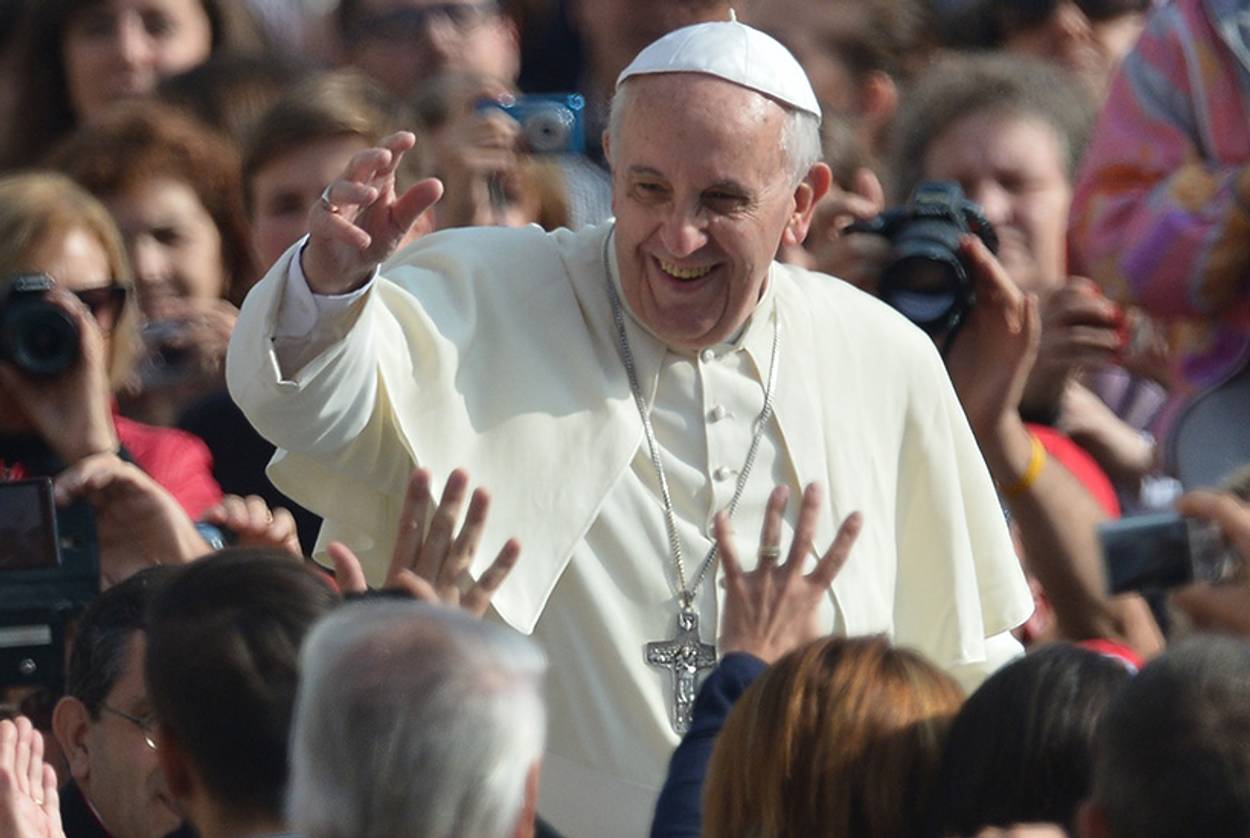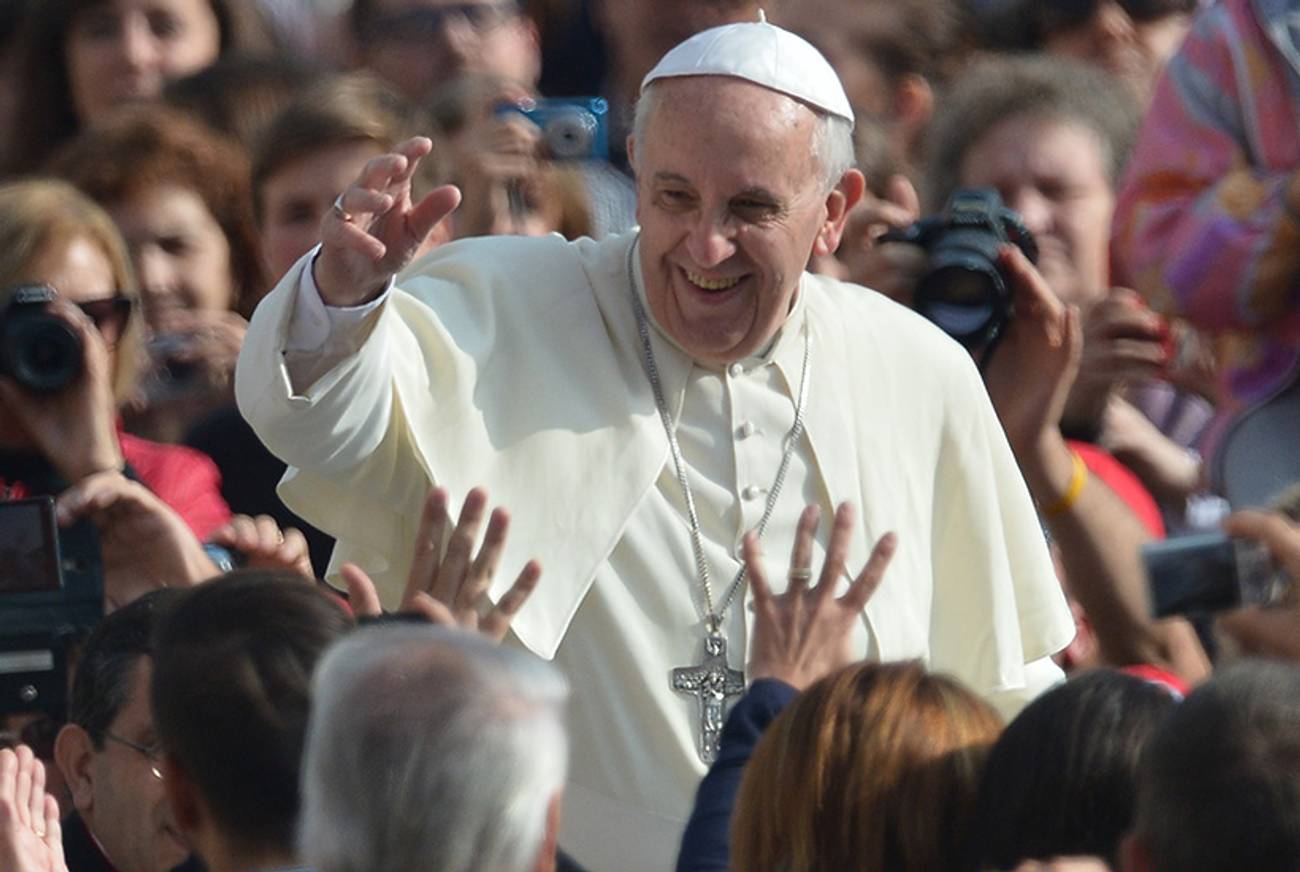How To Talk to Your Parents (and Bubbe) About the Pope
With radical views on gays, abortion, and Jews, Francis is modernizing the church. Can we convince our relatives to believe it?




Look, I’m just going to come right out and say it. The pope is awesome.
I know. It’s not a sentence I ever expected to find myself typing—at least, not without a heavy dose of sarcasm. But praise for Francis, the still relatively new pontiff, has been coming from all kinds of unlikely quarters lately. President Obama. The Guardian. Bill Maher—Bill Maher, who generally follows up any comment concerning people of faith with a snide joke about believing in talking snakes—has begun referring to his holiness as “my best buddy Pope Frank.”
Here’s why: From the moment of his election, this pope has astonished everyone with his modernity, his egalitarianism, his tolerance, and perhaps not coincidentally given his namesake, St. Francis of Assisi, his humility, and—dare I say it?—compassion.
His predecessor Benedict XVI, AKA Die Koningin von die Swamp People, may have spent most of his time harassing nuns and protecting child molesters. But Francis is cut from an entirely different bolt of cloth—one conspicuously absent of antique gold-threaded brocade. He’s disarmed feminist groups by basically declaring that if the church spent half as much time alleviating the burdens of the poor as they do telling women what to do with their bodies, they’d be a very good church indeed. He’s dared to voice the idea that divorcees (gasp!) and homosexuals (double gasp!) are equal in the eyes of the lord, no matter what forms of extramarital, un-sacramental sodomy they may choose to engage in on their own, non-church supervised time. He removed a German bishop accused of spending more than 31 million euros in church funds on his own residence (that’s a hell of a hot tub he must have put in). He’s washed the feet of juvenile offenders, and an hour ago, as of this writing, he actually kissed, in a nonsexual way, a sick man covered in tumors. I mean, come on. According to numerous liberal Catholic organizations, Francis’ actions amount to the most significant modernization of the church since Vatican II. The throne of St. Peter has at last entered the 21st century.
I’m completely sold, but then again I’ve always had had a soft spot for Catholicism. I grew up in a 60 percent Catholic town, and numerous were the occasions when I tagged along to Mass with a school friend. I’m not ashamed to say I loved it—the costumes, the pageantry, the statues of suffering saints with their eyeballs poked out or their breasts cut off, the strange overlay of vaguely masochistic sexuality on every ritual; it was everything a young girl with a dramatic streak and a healthy sense of the perverse could wish for. At any rate, it was a lot sexier and more exciting than my afternoons in Hebrew school, laboriously sounding out words to which no one ever bothered to teach us the meanings, or parsing the various irrelevant blessings for foodstuffs not eaten since the time of the Second Temple. The one thing that always gave me a pause was all the stuff about gays and women and condoms (or the conspicuous lack of any of the three), but now? Gothic imagery, sexual permissiveness, and there’s wine? That’s not a church, that’s a Susanne Bartsch party. Where do I sign up?
I kid, obviously—or at least a little bit. But the truth is that members of my generation generally aren’t the ones who need convincing. We are much too young to remember the dark days before Vatican II, of being followed home by neighborhood toughs screaming “Christkiller”; of the church’s shameful legacy of official silence (at best) in the face of anti-Semitism, nationalism, and fascism.
So, how to convince any skeptical parents and grandparents that Francis’ kinder, gentler Catholicism is here to stay? We’ve always had a healthy paranoia of those that might possibly wish us harm; it’d be nice to develop an equally sensitive radar toward who our friends may be. It might be helpful to stress the fact of this pope’s stunning ecumenicalism. He’s repeated his conviction that all faiths are equally valid, that no one religion holds the answers, that belief itself is not necessary for salvation—an astonishing claim that flies in the face of 1,000 years of Christian proselytizing. There are also his unprecedented and deeply felt ties to the Jewish community in his home country of Argentina, his statement that no true Christian can be an anti-Semite, given that Jesus and Mary were both Jews, and his touching correspondence, made public last month, with Menachem Rosensaft, a general counselor for the World Jewish Congress and the son of Holocaust survivors, on the existence of God during the Shoah. (Rosensaft delves into Francis’ response more deeply and movingly than I could; you can read his ringing endorsement of the pope in his own words here.)
I think however, that the best evidence of the radical humaneness of Francis’ approach is in his most famous answer in his first publicized interview, the one that gave us the idea that this pope might be different from what came before. Asked about his views on homosexuality, Francis said: “Who am I to judge?” The answer is, of course, is obvious: the pope. The supreme head of the Roman Catholic Church, the actual root of the word “pontificate.” And yet, in his abdication of the powers of passing judgment, Francis has already reformed the church in a way that no pope in living memory has done. You are your own moral compass, he says. We all stand equal in the eyes of God, no intermediaries necessary. It’s a very humanist idea. It’s also a very Jewish one. Now pass me the communion bagels.
***
Like this article? Sign up for our Daily Digest to get Tablet Magazine’s new content in your inbox each morning.
Rachel Shukert, a Tablet Magazine columnist on pop culture, is the author of the memoirs Have You No Shame? and Everything Is Going To Be Great. Starstruck, the first in a series of three novels, is new from Random House. Her Twitter feed is @rachelshukert.
Rachel Shukert is the author of the memoirs Have You No Shame? and Everything Is Going To Be Great,and the novel Starstruck. She is the creator of the Netflix show The Baby-Sitters Club, and a writer on such series as GLOW and Supergirl. Her Twitter feed is @rachelshukert.